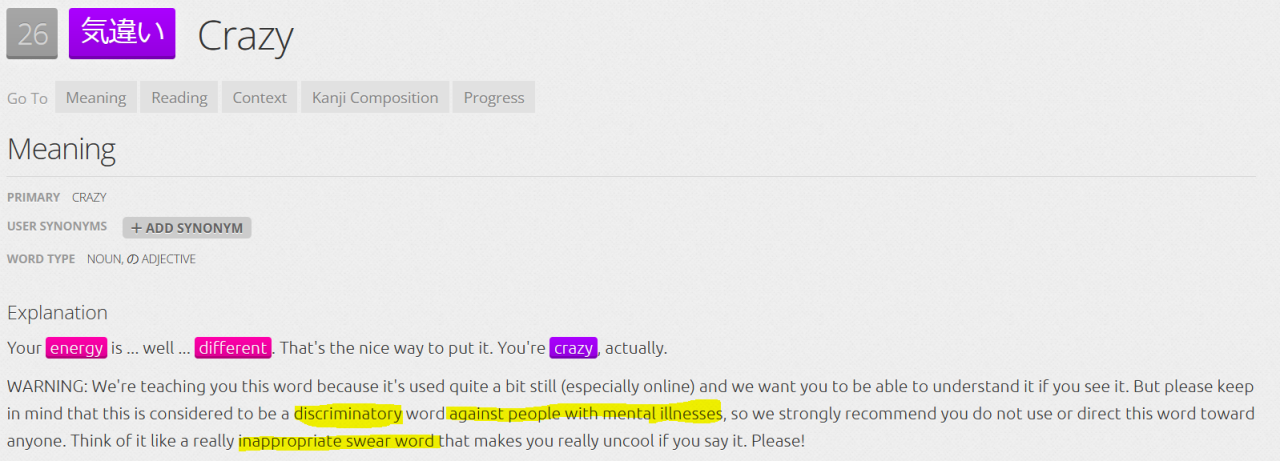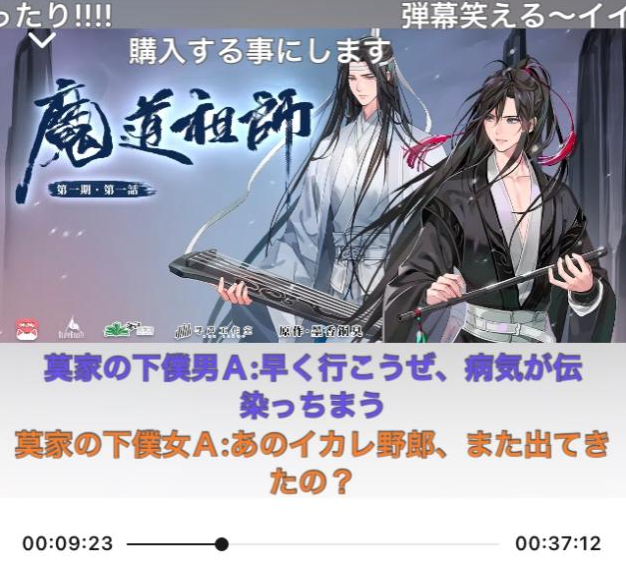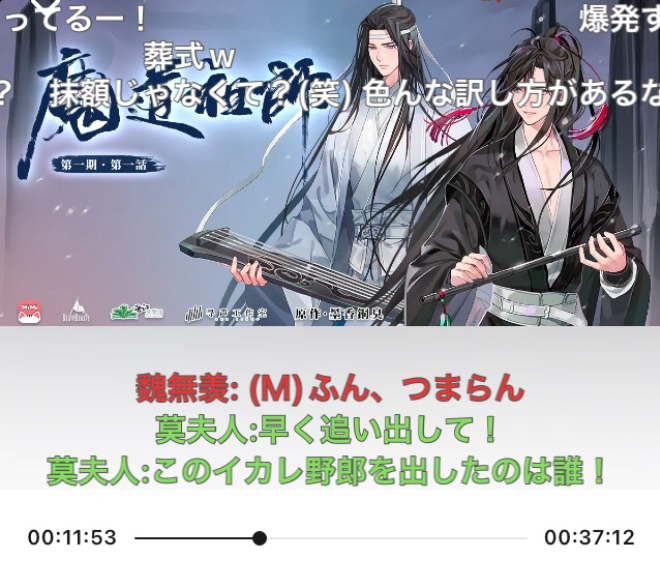Chapter 2 荒狂 Rampage
Corresponding ExR chapter: Aggression Part 3 FW pages 41-53
I know I’ve mentioned this before there’s been a bit of ambiguity regarding whether the body part rampaging Mo Manor is a hand or an arm.
Suddenly A-Ding cried, “Hand… His hand! A-Tong’s hand!” (ExR) その時突然、阿丁が泣きだした。「手……阿童の左手がぁ!」 (FW pg. 44) In that moment A-Ding suddenly burst into tears. “His hand… A-Tong’s left hand–!”
It’s a hand in this one segment. I’m using “burst into tears” to indicate more clearly that “cried” here should be the weeping kind, not the shouting kind.
On the next page
Suddenly saying this… It doesn’t seem like a coincidence. (ExR) (突然こんなことを言うなんて……まぐれとは思えない。)(FW pg. 45) (Suddenly, saying this sort of thing [out loud]… I can’t think of it as a fluke.)
Clunky, but within a reasonable margin of error.
Moving forward a few pages to when Wei Wuxian turns the deceased Mo manorial lords into his minions… Do you think he is allowed to swear? やがる is an auxiliary verb meaning “to have the nerve to do X”, and in a lot of cases, it can be used as a free pass for an emphatic and/or expletive.
“Wake up!” (ExR) 「起きやがれ!」 (FW pg. 49) “Get the fuck up!”
In case you were wondering, he was politer to the first batch of corpses.
We finally get our first instance of 凶屍 kyoushi/xiong1shi1 on FW pg 50! I’d been wondering when that word would show up. I really hate “fierce corpse” but ExR’s use of “cruel corpse” instead doesn’t make it any better. I don’t think this term translates. As far as I know, zombie lore in English comes out of Central African mythology via the Caribbean. I worry that there are not enough similar base concepts between these two cultures that we even have the vocabulary to express the concept with words that are not Chinese.
And finally, 含光君 han2guang1jun1 = gankoukun. Sobriquets don’t get glossed. What’s it mean? May I direct you to this post?
Alrighty, now time for the thesis part. One of the central motifs of MXTX’s writing style is setting up a characterization based on third hand accounts, and then using the characters’ actions to subvert those expectations. The very first instance of this is in MDZS is the irony of Wei Wuxian, in the body of Mo Xuanyu, being the smartest person in the room despite never taken seriously. What do we actually know about Mo Xuanyu himself? What has he actually told the reader? He hasn’t. He’s very dead at this point. Everything we know is filtered through A) Wei Wuxian, and B) a third person limited POV narrator, both of whom are notably not omniscient. What we can take away from the diary entries is only what Wei Wuxian can surmise (FW pg. 18-19).
- Mo Xuanyu is homosexual.
- He is a famous cultivation clan leader’s bastard, clearly out of favor with his father’s clan.
- His grandfather is the Manorial lord Mo.
- The Manorial lord’s legitimate wife birthed his oldest daughter. Oldest daughter’s husband was legally adopted into the Mo clan. Oldest daughter is Mo Ziyuan’s mother.
- The Manorial lord’s second daughter, Mo Xuanyu’s mother, was a maid’s daughter. She was good looking, so the Manorial lord had planed on marrying her off anyway.
- Mo Xuanyu’s mother’s pregnancy at age 16, and his entire existence was seen as a mark of shame upon the manor until the Manorial lord realized how to use this new relationship for financial and political gain, i.e. the alimony stipend from the paternal cultivation clan and the allure of cultivation to boost the manor’s standing. This lasted until Mo Xuanyu was 4 years old, when his biological father ceased visitation. MXY and his mother then fell out of favor for a decade.
- At age 14, MXY was taken in by his paternal cultivation clan for training. Within the Mo manor, he returns to being in favor based on an expectation of success in a skilled profession. He loses favor again when he failed to meet that expectation, and is sent home.
- The legitimate Mo manorial lords and their servants are verbally and physically abusive towards him. (FW pg. 14, 26)
- Mo Xuanyu committed suicide to enact vengeance against his abusers via dassha of Wei Wuxian. (FW pg. 16)
- He is older than Mo Ziyuan. (There are a couple different ways to spell “cousin” itoko, and relative seniority is built into the word: 従兄 older male cousin Mo Xuanyu vs 従弟 younger male cousin Mo Ziyuan.)
- Mo Ziyuan’s exact age was never confirmed. Wei Wuxian just guessed “17” and the reader has to roll with it.
さらに悪いことに、莫玄羽にいったい何があったのか莫家に戻った時にはまるっきりおかしくなっていた。ごくたまに正気に戻るものの、まるで何か恐ろしいものでも見て、精神をやられたかのように–。ここまで読み解いて、魏無羨はぴくりと眉を動かした。絶袖はまだしも、気が触れていたとは。これで合点がいった。(FW pg. 19) And to make matters worse, what on earth happened to Mo Xuanyu when he returned to Mo Manor, he had become completely funny. Although on rare occasion he returned to sanity, it was as if he may have seen something dreadful and whether his mind suffered damage–Perusing up to this point, Wei Wuxian cocked an eyebrow. Better gay than touched in the head. This is what he made out.
Note 1: おかしい okashii means “funny” in both the comical and the eccentric sense. It runs the gambit from “amusing” to “strange” to “wrong.” It gave me a slight headache trying to translate Lan Jingyi’s 「あいつは本当におかしい!」 “aitsu wa hontou ni okashii!” in Aggression part 1. I almost went with “What a weirdo!” but decided against it because I wanted the double entendre. I am being overly literal above to demonstrate ambiguity.
Note 2: まるで......のように is a two part subjunctive. I am highlighting this because it’s the strongest “if” in the entire info dump. Everything up until this point is a “based on evidence, WWX concludes that” sort of subjunctive. Japanese can get pedantic with subjunctives.
Note 3: 気が触れる ki ga fureru = to go mad; to go crazy; to lose one’s mind. Also see 気が狂う ki ga kuruu (via Jisho.org)
Preliminary conclusion: Despite the commonality of polygamy at this time, there are clear political advantages that he does not have due to his lack of blood relation to either the legal or favorite wife in either the Jin or Mo clans, combined with his discontinued apprenticeship. Anything Mo Xuanyu does is going to be an uphill battle. Untreated trauma is definitely involved. Do I trust a normal teenager to tell me they’re insane? No. Would I trust a fictional one? Even less. Sanity is relative.
Now what does everyone else say about him?
According to the Chinese literate side of the fandom, the novel and the donghua both use the same word to describe Mo Xuanyu's condition, 瘋子 feng1zi5. Lin Yutang’s Chinese-English dictionary of Modern Usage defines 瘋子 as madman, half-crazy person, a “nut.” This is not a Japanese word. In fact, the only word I can find that uses the same character is 瘋癲 fuuten, which can be either insanity, or a vagabond/wanderer (Jisho.org). The Kenkyusha’s New Japanese-English Dictionary offers 1) 狂気 lunacy, mental derangement, madness, insanity 2) 家出した若者 delinquent youth, a youth vagrant.
If I shove 瘋子 into the Weblio’s Chinese-Japanese dictionary, I get the definitions 気違い kichigai = madman, enthusiastic (derogatory) and 狂人 kyoujin = crazy person, lunatic. I’m going to add this additional note from WaniKani.

Based on this, I can conclude that Donghua!Mo Xuanyu is mentally ill, and being described in a highly derogatory manner.
I have NOT watched the Japanese dub anime so we’re going to put that on back burner for now.
The Japanese dub audio drama I only went in to double check what Mo Ziyuan and Madam Mo call Mo Xuanyu in the first 12 minutes. I did NOT bother listening to the whole episode. Transcriptions and translations below. Bold is OP’s emphasis.



00:05:10 魏無羨:お前は…… 莫子淵:ふざけるな!このイカレ野郎目!! 莫子淵:お前が今住んてるのは誰の家で
Gi Musen: You are… Baku Shien: Don’t fuck with me! You damn bastard nutcase!! Baku Shien: Whose house do you [think] you’re living in and
Note 4: Gi Musen = Wei Wuxian; Baku Shien = Mo Ziyuan.
00:09:23
魏無羨:(M)ふん、つまらん 莫夫人:早く追い出して! 莫夫人:このイカレ野郎を出したのは誰!
Gi Musen: (mentally) hmm, boring Madam Baku: Get rid of him quickly! Madam Baku: Who let this bastard nutcase out!
00:11:23 莫家の下僕男A:早く行こうぜ、病気が伝染っちゃう 莫家の下僕女A:あのイカレ野郎、また出てきたの?
Male Baku household servant A: Hurry up, let’s go, or we’ll get infected Female Baku household servant A: That bastard nutcase got out again?
Jisho.org defines いかれる ikareru as: 1) to break down, to become broken; 2) to be crazy, to be nuts; 3) to be infatuated with; 4) to be outdone by someone; to be beaten in a contest. 野郎 yarou Bastard in the above instances is simply for its derogatory meaning, and has no implications of linage. So you see how I ended up with イカレ野郎 = bastard nutcase? Japanese audio drama!Baku Gen'u (=Mo Xuanyu) is also mentally ill, and it is being described in a derogatory manner.
Back to the novel! Over these past 40 pages, I’ve seen several different words come up in addition to what was written above.
痴れ者 shiremono fool; dunce; idiot (via Jisho.org). This is the most common one, and what the Manorial lords and their servants all call Mo Xuanyu. Even Lan Jingyi calls him this once in frustration. I’m not going to to the full nine yards on this one. I did quite a bit in the Aggression part 2. But just for completeness’ sake, I give you a couple more.
「俺を蹴ったな!この痴れ者め、殺す気?」 (FW pg. 46) (Lan Jingyi speaking) “He kicked me! Damn idiot, you got a death wish?”
From The Digital Denjisen via Kotobank
- 愚かな者。ばか者。A foolish person. A stupid person.
- 手に負えない者。乱暴なもてあまし者。An incorrigible person. A violently unmanageable person.
- その道に打ち込んでいる者。その道のしたたか者。Someone dead set in their ways. A strong-willed person. > 「我がものならば着せてやりたい好みのあるにと―が随分頼まれもせぬ詮議を蔭では為べきに」〈露伴・五重塔〉 [類語](1)愚人・愚物・痴人・愚か者・愚者/(3)マニアック・病的・クレージー・いかれる・神経質・凝り性・モノマニア・モノマニアック・偏執狂・執念深い・アブノーマル・異常・異様・狂的・ディレッタント・物好き・酔狂・好事家・虫・おたく・狂・狂い・気違い・マニア・通・こだわり・こだわる・道楽・凝り屋・執拗・しつこい・サブカルチャー
From Meaning.jp
- 愚か者・馬鹿者 foolish person. stupid person.
- 騙されやすい・お人好し someone easily tricked. an easy mark.
- 考えなしで分別にかける人 a person with thoughtless discretion.
And from Word-dictionary.jp
- ばか者、おろか者 a stupid person, a foolish person
- 一つのことに心を打ちこんで夢中になっている人 a person who has devoted their heart to a singular thing and becomes obsessed.
I am genuinely unsure if there are any unspoken connotations of this word, and thus far I have not been able to dig any up. I need to watch more period J-dramas.
バカ baka idiot; moron; fool (we’ve watched enough anime. I don’t need to provide all 14 definitions listed on Jisho.org)
このバカ、こんな時まで笑うなんて!虚け者なのだから (FW pg. 44) What a moron, laughing at a time like this! Cause he’s an airhead…
虚け者 utsukemono fool; blockhead; idiot; dunce (see example above). The more common spelling of this word is 空け者. I like “airhead” for this one because 虚 “void” 空 and “sky” both also mean “empty.” Let’s take a look at a couple more dictionaries.
うっかりしている人。中身のしっかりしていない人。単に「うつけ」とも言う。(Weblio) An absentminded person. Someone who does not take proper hold of their substance. Also said utsuke.
For utsuke because I didn’t get a result for utsukemono 1) 中のうつろなこと。から。からっぽ。 2) 愚かなこと。ぼんやりしていること。また、そのような者。まぬけ。(Digital Denjisen) 1) To hollow out the inside of something. Empty. Vacant. 2) Foolishness. To be absentminded/careless. Or someone who is thus. Half-wit.
恥知らず haji shirazu shameless (Madam Mo in response to Wei Wuxian’s allegation of theft against Mo Ziyuan)
「この恥知らずが、皆さんの前でなんてことを!阿淵はあなたの従弟なのに!」 (FW pg. 28) “What a thing to say in front of everyone, you shameless person! Even though A-Yuan is your cousin!”
阿保 aho fool; idiot; simpleton
(Lan Jingyi speaking)
「え?あの阿保を捜してどうするんだよ?俺に殴られるのが怖くて、どこかに逃げたんじゃないかな」 (FW pg. 52) “Eh? What’re you gonna do if you go searching for that dimwit? He probably ran off somewhere cause he was scared I was gonna punch him.”
変人 henjin eccentric. Truth be told, I’m not sure why this is in my notes. Past me didn’t leave a page number.
There is a specific word for madness I was looking for, something containing this character: 狂. And there is only one instance I found where it shows up (not counting the chapter title).
With nails that multiplied in length, foam gathering at the corners of her mouth, and shrieks that were enough to uplift the ceiling, she [the animated corpse of Madam Mo] looked extremely insane. (ExR)
右手の五本の指の爪は数倍にも長く伸び、口元には白い泡を吹き、甲高い咆哮は屋根を吹き飛ばそうな勢いで、もはや狂気の沙汰だ。(FW pg. 50) The nails on the five fingers of her long hand extended by several times, white foam spewed from her mouth, her screeching roar had the force to blow a roof clean off, and she was already in a state of madness.
TLDR: Japanese novel!Mo Xuanyu is generally described by other people as a dunce, not necessarily a lunatic. The only “insanity” to be had is a dead person’s fighting style.
A little thought experiment I keep finding myself in, as I’m sure a lot of people do who are reading literature in a language they are learning, is “if I were to translate this into my first language, how would I say X?” I would need a word that
- encompasses “stupid”;
- does NOT encompass “clinically insanity”;
- is derogatory;
- and most importantly, destroys all credibility.
“Oh, don’t listen to him. He’s just ___.”
“Idiot” is the clear choice, as it is the most common denominator of all of the above, but I feel it’s not strong enough to devalue all of MXY’s credibility. “Simpleton”, “airhead,” “dimwit,” “halfwit,” “moron,” “blockhead” again, not mean enough. “Dunce” or “fool” might be on the right track, but they’re not really in the modern vernacular, so still not strong enough on their own without going out of my way to make the rest of the setting and everyone else’s speech patterns artificially archaic. “Maniac” doesn’t seem accurate to the characterization. “Deluded” perhaps? “Deranged” feels too close to “raving mad”. “Beyond help” or “lost cause” or “unreasonable” would work in the above instance, but not necessarily in other instances, like “He kicked me! Damn ___!”
…and this is how I found myself up the creek without a paddle, and asking whether I have to start looking at yesteryear’s terms for the disabled to find a label mean enough to destroy credibility. FOR EXAMPLE, I would not be opposed to an autistic reading of the character based on the above amalgam of terminology, but endorsing such a reading would be going into head canon territory and straying too far from the original text. I don’t know what’s going on deeper in the fandom. I see a lot of arguing I don’t want to deal with, and the less I know, the better I feel.
All I can and will say about Japanese Novel!Mo Xuanyu is that no matter how he is labeled by his relatives and household servants, the kid is caught between a rock and a hard place on multiple fronts. Being homosexual in a homophobic world isn’t helping, nor is whatever enduring trauma he experienced right before his return home from cultivation training. His anger and frustration before his untimely demise were likely justified. It is highly unfortunate he found catharsis in death, but without it, this story would have no protagonist.